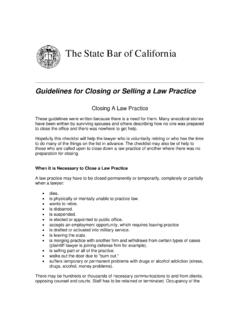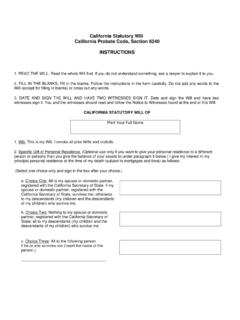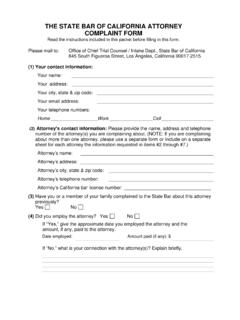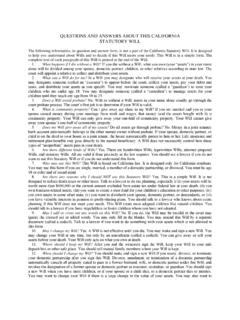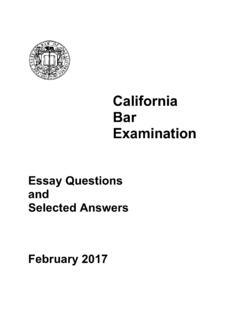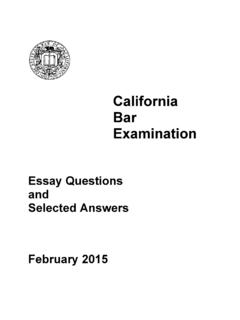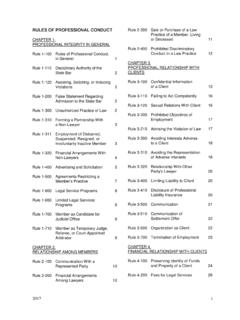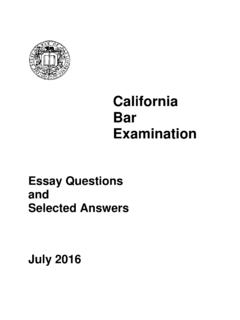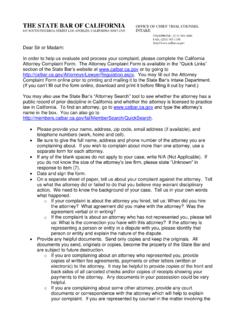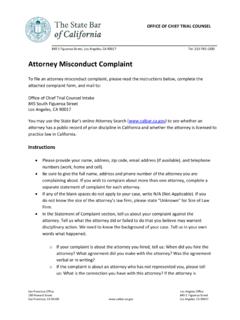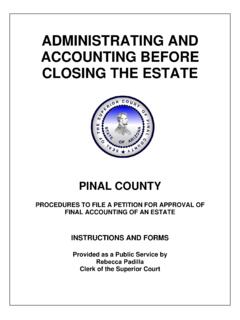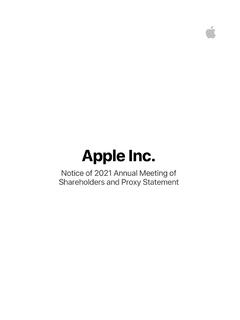Transcription of Rule 3.7 Lawyer as Witness (Rule Approved by the Supreme ...
1 1 Rule Lawyer as Witness (Rule Approved by the Supreme Court, Effective November 1, 2018) (a) A Lawyer shall not act as an advocate in a trial in which the Lawyer is likely to be a Witness unless: (1) the Lawyer s testimony relates to an uncontested issue or matter; (2) the Lawyer s testimony relates to the nature and value of legal services rendered in the case; or (3) the Lawyer has obtained informed written consent* from the client. If the Lawyer represents the People or a governmental entity, the consent shall be obtained from the head of the office or a designee of the head of the office by which the Lawyer is employed.
2 (b) A Lawyer may act as advocate in a trial in which another Lawyer in the Lawyer s firm* is likely to be called as a Witness unless precluded from doing so by rule or rule Comment [1] This rule applies to a trial before a jury, judge, administrative law judge or arbitrator. This rule does not apply to other adversarial proceedings. This rule also does not apply in non-adversarial proceedings, as where a Lawyer testifies on behalf of a client in a hearing before a legislative body. [2] A Lawyer s obligation to obtain informed written consent* may be satisfied when the Lawyer makes the required disclosure, and the client gives informed consent* on the record in court before a licensed court reporter or court recorder who prepares a transcript or recording of the disclosure and consent.
3 See definition of written in rule (n). [3] Notwithstanding a client s informed written consent,* courts retain discretion to take action, up to and including disqualification of a Lawyer who seeks to both testify and serve as an advocate, to protect the trier of fact from being misled or the opposing party from being prejudiced. (See, , Lyle v. Superior Court (1981) 122 470 [175 918].) 1 NEW RULE OF PROFESSIONAL CONDUCT (Former Rule 5-210) Lawyer as Witness EXECUTIVE SUMMARY The Commission for the Revision of the Rules of Professional Conduct ( Commission ) evaluated current rule 5-210 (Member as Witness ) in accordance with the Commission Charter.
4 In addition, the Commission considered the national standard of ABA Model Rule ( Lawyer as Witness ). The Commission also reviewed relevant California statutes, rules, and case law relating to the issues addressed by the proposed rules. The result of this evaluation is proposed rule ( Lawyer as Witness ). Rule As Issued For 90-day Public Comment Proposed rule is one of ten rules in Chapter 3 of the proposed Rules of Professional Conduct. The general content, framework and numbering scheme of this subset of the Rules is based on Chapter 3 of the ABA Model Rules, which is entitled Advocate. Model Rules Chapter 3 corresponds to Chapter 5 of the current California Rules, entitled Advocacy and Representation.
5 The following table shows the Chapter 3 Model Rules and the corresponding California rules: Model Rule California Rule (Meritorious Claims & Contentions) 3-200 (Prohibited Objectives of Employment) (Expediting Litigation) No Cal. rule counterpart. (Candor Toward The Tribunal) 5-200 (Trial Conduct) (Fairness to Opposing Party & Counsel) 5-220 (Suppression of Evidence) 5-310 (Prohibited Contact with Witnesses) 5-200(E) (Impartiality and Decorum of Tribunal) 5-300 (Contact with Officials) 5-320 (Contact with Jurors) (Trial Publicity) 5-120 (Trial Publicity) ( Lawyer As Witness ) 5-210 (Member As Witness ) (Special Responsibilities of a Prosecutor) 5-110 (Performing the Duty of Member in Government Service) 5-220 (Suppression of Evidence) 5-120 (Trial Publicity) (Advocate In Non-adjudicative Proceedings) No Cal.
6 Rule counterpart. (Threatening Criminal, Administrative, or Disciplinary Charges) 5-100 (Threatening Criminal, Administrative, or Disciplinary Charges) The Commission is recommending the adoption of the Model Rule framework and numbering for this series of rules. Proposed rule carries forward the substance of current rule 5-210 that sets the requirements when a Lawyer acts as a Witness in a client s matter pending before jury. The main issue was whether to provide broader public protection by expanding the scope of the rule beyond matters before a jury to other proceedings, such as a proceeding before a trial judge, an administrative 2law judge or an arbitrator.
7 The Commission is recommending that this change be implemented in the proposed rule. The Commission believes that the intended public protection afforded by the current rule applies equally to bench trials. A client s interest is promoted by requiring lawyers to obtain the client s informed written consent where required by the rule. The nature and extent of the disclosure might vary between a bench and jury trial setting, but that does not alter the benefits of requiring client consent. In addition, the rule s application to jury trials is the standard in the majority of jurisdictions that have adopted Model Rule This substantive change is incorporated in proposed paragraph (a).
8 Paragraph (b) permits a Lawyer to act as an advocate when another Lawyer in the same firm is likely to be called as a Witness , unless precluded by a conflict of interest. Comment [1] clarifies that paragraph (a) only applies to trials before a jury, judge, administrative law judge or arbitrator and does not encompass other adversarial proceedings or non-adversarial proceedings. One example of a situation excluded from the ambit of the rule would be a client s matter where a Lawyer will testify in a hearing before a legislative body. Comment [2] explains that a client s informed written consent might be documented by a recital on the record that is thereafter included in a transcript.
9 Comment [2] also includes a reference to the definition of written in proposed rule (n). Comment [3] reaffirms a court s discretion to take action despite a Lawyer s compliance with this rule ( , a Lawyer who complies might nevertheless be subject to a disqualification motion). See Comden v. Superior Court (1978) 20 906, Smith, Smith & Kring v. Superior Court (Oliver) (1997) 60 573, 579-582 and Colyer v. Smith (1999) 50 966.) Compare Kennedy v, Eldridge (2011) 201 1197 [135 545] (Applying Model Rule rather than rule 5-210 in support of court s decision to disqualify Lawyer - Witness ). Post-Public Comment Revisions After consideration of comments received in response to the initial 90-day public comment period, the Commission made no changes to the proposed rule and voted to recommend that the Board adopt the proposed rule.
10 The Board adopted proposed rule at its November 17, 2016 meeting. Supreme Court Action (May 10, 2018) The Supreme Court Approved the rule as submitted by the State Bar to be effective November 1, 2018. 1 Rule 5-210 MemberLawyer as Witness (Redline Comparison to the California Rule Operative Until October 31, 2018) (a) A memberlawyer shall not act as an advocate before a jury which will hear testimony from the memberin a trial in which the Lawyer is likely to be a Witness unless: (A) The(1) the Lawyer s testimony relates to an uncontested issue or matter; or (B) The(2) the Lawyer s testimony relates to the nature and value of legal services rendered in the case; or (C)(3) The member has the Lawyer has obtained informed, written consent of* from the client.
